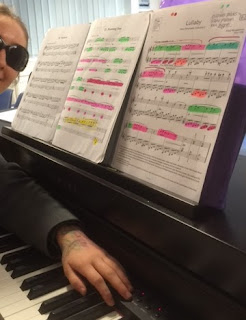B.D.A. Music does have a small
database of teachers who are aware of neuro-diverse conditions including
dyslexia and dyspraxia. The B.D.A. cannot
endorse any particular teacher but can pass on such contacts as it has.
Please email bdamusicdyslexia@gmail.com giving
your name, the age and standard of the pupil and instrument/voice and the area
of the UK in which you live.
Alternatively, you can try to find some suitably
(musically) qualified local teachers and then ring them up one by one and ask
them what they know about dyslexia and dyslexia-aware teaching methods. If they
are completely ignorant but willing to learn, then you could pass on our
information booklet and 'Top Ten Tips' which can be accessed from the BDA
website’s ‘Music and Dyslexia’ page
Various organisations publish databases of teachers
recommended by them. None of these have list of specifically dyslexia
aware teachers but you can use these to find some reputable teachers.
The Incorporated Society of Musicians' database is very reliable in terms of
qualifications (see below).
Ask the teacher if he or she is aware of dyslexia. If so,
what do they know about it? Are they aware that it affects music and music
learning? If so, what do they know about this? What do they understand by
‘multi-sensory teaching’? Have they read anything (and if so, does it include
information from B.D.A. Music and any of the books listed at the end of B.D.A.
Music’s information booklet)? Ask them, perhaps at a meeting, for suggestions
of ways in which they might teach the student involved.
Organisations that have databases of teachers
ISM: The Incorporated Society of Musicians.
Directory gives qualifications, instrument and biography.
All members of the ISM have to have been recommended by someone of standing in
the music profession.
AOTOS: The Association of Teachers’ of Singing
Directory of Members/Find a singing teacher. The
directory gives qualifications and teaching categories.
EPTA: The European Piano Teachers’ Association
Directory includes basic data: in some cases only contact
details.
MusicTeachers.co.uk (working in association with the
Musicians Union).
Directory gives qualifications, instruments, ability
levels taught and notes including membership of relevant organisations such as
those above.
Note
1. Beware of general ‘Find a music
teacher’ type websites which do not endorse teachers with any membership of a
professional organisation.
2. Look carefully at
qualifications and check what they mean. Contact B.D.A. Music further about
this, if necessary.
Also
Do you know other dyslexic musicians in your
area or at your local Higher Education Institution? If so, do any of those
people work with someone ‘good’ – someone that understands dyslexia and teaches
them in a way that they can get on with?
Can any other dyslexic music students help
you?

No comments:
Post a Comment